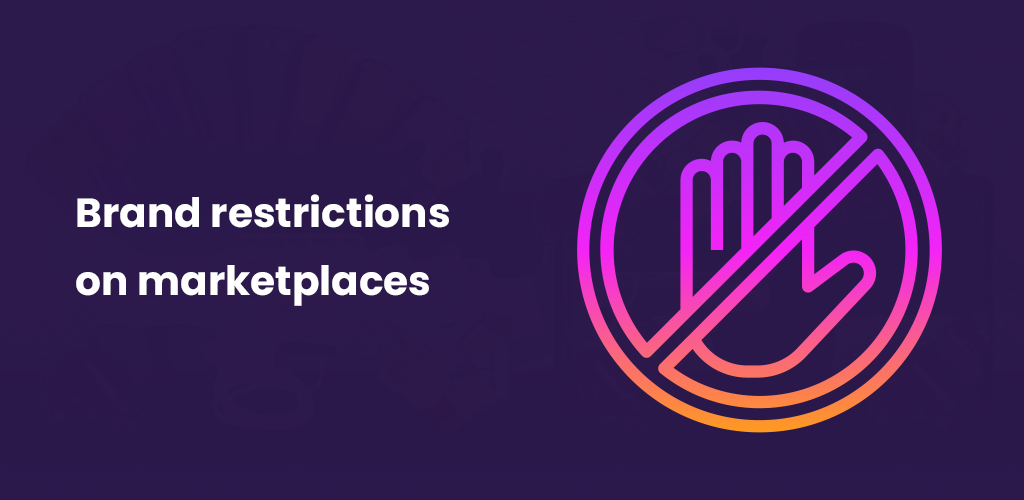Branded items on marketplaces: what you need to know
We discussed the challenges of selling on marketplaces recently, and as experienced retailers will already be aware of, it isn’t a walk in the park. Alongside the significant challenges of managing to make sales, stay ahead of your competitors and keeping prices at a level that doesn’t hurt your profit margins too much, there is the added challenge of having your account penalised if a complaint is made. And complaints about sellers don’t just come from customers – other sellers may complain to the marketplace, and brand owners too. When those complaints are lodged, the marketplaces investigate – starting with suspending the seller account. With the risk that comes to your business, is it worth even attempting to sell branded items? We take a look.
Why do marketplaces restrict sales of branded items?
You can probably already guess at why marketplaces restrict branded items. Knowing these reasons don’t make it any easier for sellers, but forewarned is forearmed, and can help you to establish a way forward.
Customer confidence
Customers like shopping with marketplaces like Amazon and eBay because they know they have support if something goes wrong with their order. Maybe they received the wrong size, the wrong colour, or maybe even the wrong item altogether (mistakes will always be made when humans are involved after all). By buying from a marketplace, rather than directly from a retailer, customers know they will have a place to escalate to if they do encounter an issue with their order, and the seller doesn’t resolve the issue as they would like.
Reducing counterfeiting
In the early 2000s when eCommerce was starting to become a thing, many consumers questioned the authenticity of the products that were being sold. There was a lot of discussion about fake products, especially when buying from a company based outside of the UK. Customers came to know and trust the Amazon marketplace, and they knew that that they could contact Amazon to help resolve the issue if they did receive a fake item. Trust in eBay sellers was slower to build, but as more retailers and professional sellers came to sell there, so customers learnt what to look for and how to avoid potentially counterfeit items.
Protection for brand owners
Although marketplaces are there for businesses to sell through, they have long been concerned with offering protection for brand owners. After all, if a brand that is a household name announces that they don’t allow their products to be sold through Amazon or eBay, that would put a huge dent in the confidence of customers buying on the platform. So it makes sense that they work with brand owners to help prevent unauthorised selling of those items. In doing so, they’re helping to prevent the sale of stolen goods, and helping brand owners to prevent the value of their brand being decreased.
Where there are agreements for brand exclusivity, marketplaces can help to maintain such arrangements. It might be that the brand is only sold through their own website or through another marketplace or department store retailer, such as with designer handbags. Or it might be that the brand owner sells on the marketplace, but doesn’t permit any other retailer to sell their products on that marketplace – helping to eliminate product bought on the grey market.
Marketplaces like Amazon have had brand registry available for brand owner to register their products as theirs for a long time. Until relatively recently, sales of items that were registered to brand owners weren’t actually restricted. This meant that brands would need to send cease and desist letters, and ultimately then take legal action where necessary. Now, however, brands can restrict sales of their items by third party sellers, which means that sellers who have procured stock or have a DropShipping arrangement can’t sell on those marketplaces.
What do you need to sell brands on marketplaces?
Marketplaces may stipulate that sellers need a trademark license, proof of patent or copyright ownership to be able to sell branded goods on marketplaces. If you’re a retailer or are DropShipping, then ideally you’ll have correspondence with the brand owner that confirms they have authorised your business to sell their products. The letter of authorisation is likely to need:
- To have been issued by the owner or an employee of the brand owner
- To be issued on company letter head of the brand owner
- The brand name in the letter that has been issued to you will need to match the brand name you’re selling
- The name the letter is addressed to should match the name on your seller account
You may need to provide additional evidence, such as emails sent by the brand owner to your business. If you are DropShipping, you may need a letter from your supplier confirming that they have authorisation from the brand owner to resell items.
Without sufficient evidence that you have obtained authorisation to sell items from that brand, your seller account is at risk of being suspended until the marketplace has investigated. Appeals to get your account reinstated can be long and drawn out, and (particularly on Amazon), accounts often end up being terminated with funds being held, leaving you out of pocket. Working with a solicitor that specialises in marketplace law to appeal your case can sometimes result in your account being reinstated, but this comes at additional cost and doesn’t guarantee that you will get the result that you want.
How can you know which brands are restricted?
Amazon doesn’t provide a comprehensive list of brands that you can check, and searching for one for eBay UK didn’t bring us any official results either. There are unofficial lists to be found online for many marketplaces, but they are published by third parties, and since none of them are issued by the marketplaces themselves, they may not be very accurate.
Although this may not seem overly helpful, our advice is that unless you have specific authorisation to sell branded items on a marketplace, it is best to use caution and not sell those items on marketplaces.
For more information, direct from the marketplaces:
- You can find the Amazon Brand Name Policy here and the intellectual property policy here.
- You can find the eBay UK Verified Rights Owner (VeRO) policy here.
- You can find OnBuy’s stance in their Terms and Conditions here
- You can find the Wish Intellectual Property policies here, and how to provide proof of authorisation here.
Other marketplace policies can be found fairly easily, and it is well worth your time to be informed and to prevent your seller account being restricted. If you can’t find anything specifically mentioning brands, we still recommend erring on the side of caution.
Can I sell branded items on my own website?
You’re less likely to encounter issues with selling branded items on your own website – especially if you’re not using Shopify or a similar eCommerce website provider. However, it isn’t completely risk free. Brand owners that don’t want their products sold on unauthorised channels may issue cease and desist letters (causing issues for you if you have bought stock on the grey market), or they may flag your activities to PayPal.
PayPal take action to disallow the use of their service with any products that infringe intellectual property rights – which, depending on where your PayPal business account is used, could have far-reaching implications for your business. If the marketplaces you sell on are linked with that PayPal account, you could find this becomes a difficult thing to resolve.
What if I am DropShipping branded items?
While some retailers may have bought stock legitimately and be allowed to sell items from brand owners online, DropShipping is different. As you’ll already be aware, DropShipping is selling products without buying stock first – which means that many DropShipping businesses aren’t likely to have permission from the brand owner to sell those items.
If your supplier has branded items, and you have an agreement in place that you are allowed to sell those items then there may be no problems – but you need to be able to prove that to the marketplace if they query it. Not only do you need to be able to prove it, but you’ve also got to be able to satisfy the marketplace that the agreement is legitimate. With so many challenges in place, there is little wonder that many sellers end up with their seller accounts on some marketplaces either restricted, suspended or completely terminated.
Although you may be able to find branded items to sell – especially if you are working with suppliers that have their products available through DropShipping marketplaces like Avasam – tread carefully. Having the ability to list those branded items on marketplaces doesn’t mean that you should without careful thought. If you source branded products that you don’t have authorisation for, and then sell them on marketplaces with restrictions in place, your seller account is at risk on those marketplaces, or even beyond if the complainant contacts PayPal.
While you might be able to get that situation resolved with the help of the supplier and brand owner, there are no guarantees that your seller account will be reinstated. The DropShipping platform will be able to offer assistance, but ultimately, the responsibility to ensure you’re selling the right products is yours – and the DropShipping platform are under no legal obligation to help you. Be sure to know the stance of the platform by checking terms and conditions before you source and sell those items.
Selling branded items on marketplaces – even if you hold the stock, and you have the authorisation of the brand owner – it can be a tricky thing to handle. If you’re selling branded items on marketplaces, be sure to have the proof of authorisation from the brand owner available, in case any disputes are created. Without such documentation, you’re likely to have your seller account suspended until you have obtained permission from the brand owner, or your account may be terminated.
This post contains affiliate links. If you use these links to buy something, we may earn a commission. We only use referral links for businesses that we would use ourselves. Thanks for your support!



DropShip products from verified suppliers to diversify your inventory and scale your eCommerce business